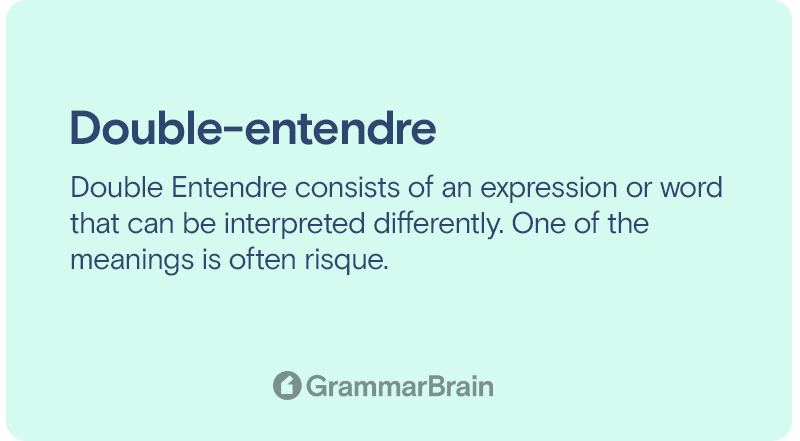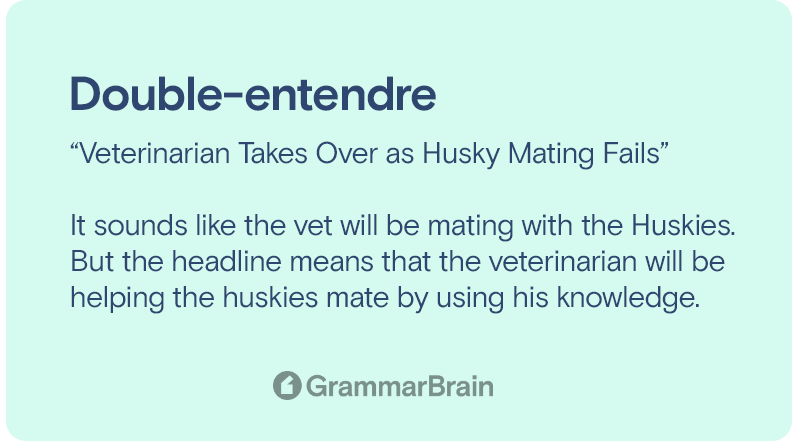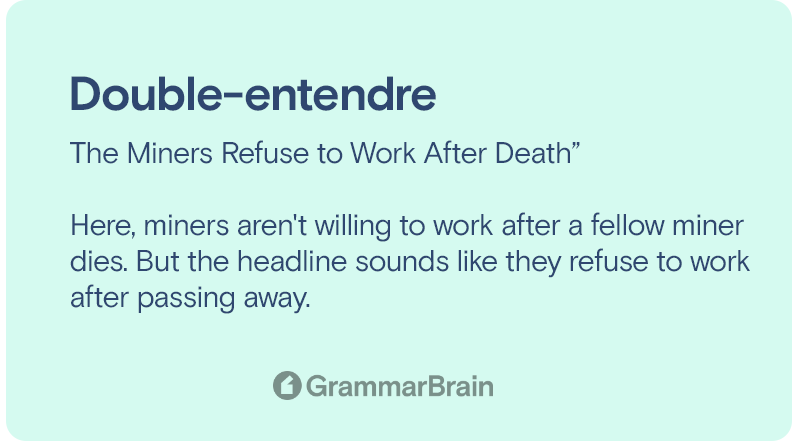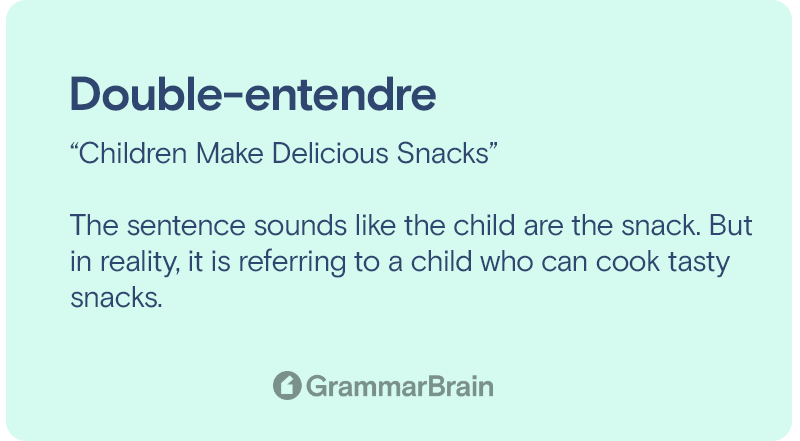What are great examples of double-entendre? The phrase ‘Double Entendre’ is unique to hear. It isn’t something that you hear often, unless you are an English major student. Double entendres can either be inappropriate or funny. It all depends on what the speaker or person is trying to say.
Today, we will be elaborating on the topic, along with some examples, to help you grasp what it’s all about.

What Is a Double Entendre?
Double Entendre consists of an expression or word that can be interpreted differently. One of the meanings is often risque.
It is essential to consider the listener upon its use so as not to offend them. The risqué meaning is also known as an innuendo.
Have you heard about one of the most popular double entendres from American advertising? Shirley Polykoff was responsible for creating this slogan, which goes as ‘Does She or Doesn’t She?’
It was for promoting the hair coloring of Clairol. The word ‘Double Entendre’ traces its origins to France, and it’s italicized and hyphenated sometimes.
Descriptive Example
In the blockbuster movie ‘Finding Nemo,’ the fishes start colluding to clog the tank’s filter. They want to dirty the tank to the point the owner decides to clean it.
One of the fishes encourages the rest to be filthy. To quote “be as gross as possible, think dirty thoughts!”
Here, the children laugh at the sound of it because they think that the fish are gross. On the other hand, the adult audience will snicker because of the sexual connotation behind that line.
This is what we mean by double entendre. It’s basically a phrase or sentence with dual meanings and can be perceived differently by the audience.
Upon initial listening and at face value, it has a literal meaning. But the second meaning is taken in a risqué manner once the listener goes beyond the surface.

Examples of Double Entendre in Literature
Now that we know the meaning of the term, let us delve into some examples of it in the literary sense:
The Most Dangerous Game
In this famous story, there is a hunter who is highly skilled in chasing and has mastered the art of the hunt. But he craves a brand new challenge.
Here, the story’s title depicts or hints at both a clue and words. The game refers to an animal being hunted for food or sport.
Which animal, in your opinion, would pose the biggest threat to the hunter? Here, the animal is the most dangerous game.
But a game is a competition of endurance, skill, and chance. The majority of the time, folks partake in games for self-amusement.
However, if their life depended on the game, it would be the most dangerous. Are you seeing the double entendre at play here?

Homer, The Odyssey
Odysseus successfully captures the cyclops and proceeds to blind it. Here, Cyclops are one-eyed giants.
He claims himself as ‘Oudeis’ when the cyclops cries and begs him to reveal his identity. Then, the cyclops yells and cries out to the other monsters that Oudeis has hurt him.
But the word ‘Oudeis’ translates to ‘No One’ in the Greek language. So, none of the monsters bothers to help him, allowing Odysseus to escape.
Here, the cyclops is using a double entendre. He is crying out that Oudeis has blinded him while saying ‘No One,’ at the same time.

Examples of Double Entendre in Media/TV
Double entendre is very much present in media and TV as well. You would be surprised by how prevalent it is in everyday writing,
These double entendres consist of witty word plays, and writers often use them for better literary effects.
Here are some of the double entendre in media:
- Juvenile court to try taking out the defendant.
- A drunk gets nine months in a violin case.
- Survivor of Siamese twins joins parents.
There is numerous usage of double entendre in numerous television series as well. However, they are mainly geared toward the adult audience.
Examples of Double Entendre in Poems
Double entendre is also heavily used by poets in their works. Next, let us look at some double entendre examples in poetry:
Romeo and Juliet – William Shakespeare
Nurse: “God ye good morrow, gentlemen.”
Mercutio: “God ye good den, fair gentlewoman.”
Nurse: “Is it good den?”
Mercutio: ” ‘Tis no less, I tell you; for the bawdy hand of the dial is now upon the prick of noon.”
Nurse: “Out upon you! What a man are you!”
Did you notice the double entendre in this exchange? Here, Mercury is describing the clock as possessing a ‘Lustful’ or ‘Bawdy’ hand, which is ‘Upon the Prick of Noon.’
Here, if the listeners are paying attention to this exchange, then this dialogue should amuse them, just as should the nurse’s response or reaction towards it.
The Importance of Being Earnest – Oscar Wilde
Let’s point out the use of double entendre with this popular line from the poem:
“On the contrary, Aunt Augusta, I’ve now realized for the first time in my life the vital Importance of Being Earnest.”
Here, the word ‘Earnest’ translates to the character’s name and personality trait. The characters tend to have double lives in the story, and Jack realizes it’s imperative to be earnest.
Earnest means to be honest, but it also translates into a fictional persona. It’s someone who keeps stumbling upon multiple opportunities in life.
Examples of Double Entendre in Pop Culture
Double entendre has also made its way into the pool of pop culture. If it’s used intentionally for entertainment purposes, you can expect a proper response from the listeners.
Let’s explain its usage in pop culture with some of these well-known shows and platforms:
The Office
You must have heard of this popular mockumentary television series. Here, the boss and character ‘Michael Scott,’ can’t help but always say ‘that’s what she said.’
He loves saying this whenever something has the potential to be even a little racy. The words told before, ‘that’s what she said,’ possess an ordinary meaning.
However, after the addition of ‘that’s what she said,’ everything ends up sounding explicit. They are making a dirty joke out of these common words.
The Cat in the Hat
Many family movies subtly use double entendre. They want the adults to get it while the younger audience doesn’t.
In the movie ‘The Cat in the Hat,’ the cat creates a joke using gardening equipment, i.e., a Garden Hoe.
The cat insults the Garden Hoe for scaring off the dogs and calls it dirty. Here, the wordplay is clever because its usage is vulgar if it’s referred to a person.
Bellamy Brothers Song
Everybody has heard of their song, “If I Said You Had a Beautiful Body (Would You Hold It Against Me).”
A colloquial meaning is present here with the line ‘Hold It Against Me,’ which translates into ‘Be Angry with Me.’
But the line could be taken literally in a sexual way, as in holding one’s body.
Accidental Double Entendre Examples
Double entendre are phrases and words that can be interpreted in various ways. They aren’t always intentional and explicit.
It’s normal for double entendres to be used accidentally, especially in newspaper headlines. Let us look at some of these hilarious accidental double-entendre examples:
- Veterinarian Takes Over as Husky Mating Fails – It sounds like the vet will be mating with the Huskies. But the headline means that the veterinarian will be helping the huskies mate by using his knowledge.
- The Miners Refuse to Work After Death – Here, miners aren’t willing to work after a fellow miner dies. But the headline sounds like they refuse to work after passing away.
- Children Make Delicious Snacks – The sentence sounds like the child are the snack. But in reality, it is referring to a child who can cook tasty snacks.
- Criminals Receive 9 Months in the Violin Case – The headline sounds like the criminals will spend 9 months incarcerated inside a violin case.
- New Obesity Test and Study Looks for Bigger Test Group – This sentence sounds like the study is looking beyond the morbidly obese test group.
FAQs
What Is the Term for a Word That Has a Double Meaning?
It is called Double Entendre. Here, the phrase or word is all about duality with its translation.
The receiver will either find it funny, awkward, or offensive.
What Is an Entendre in English?
Entendre is a Verb, and it translates into hearing something. It is to receive sounds using your ears.
When a Person Says One Thing But Means Another?
How Do You Pronounce Double Entendre?
You can pronounce the word in this manner – ‘dob-el antandra.’
Inside this article
Fact checked:
Content is rigorously reviewed by a team of qualified and experienced fact checkers. Fact checkers review articles for factual accuracy, relevance, and timeliness. Learn more.
Core lessons
Glossary
- Abstract Noun
- Accusative Case
- Anecdote
- Antonym
- Active Sentence
- Adverb
- Adjective
- Allegory
- Alliteration
- Adjective Clause
- Adjective Phrase
- Ampersand
- Anastrophe
- Adverbial Clause
- Appositive Phrase
- Clause
- Compound Adjective
- Complex Sentence
- Compound Words
- Compound Predicate
- Common Noun
- Comparative Adjective
- Comparative and Superlative
- Compound Noun
- Compound Subject
- Compound Sentence
- Copular Verb
- Collective Noun
- Colloquialism
- Conciseness
- Consonance
- Conditional
- Concrete Noun
- Conjunction
- Conjugation
- Conditional Sentence
- Comma Splice
- Correlative Conjunction
- Coordinating Conjunction
- Coordinate Adjective
- Cumulative Adjective
- Dative Case
- Determiner
- Declarative Sentence
- Declarative Statement
- Direct Object Pronoun
- Direct Object
- Diction
- Diphthong
- Dangling Modifier
- Demonstrative Pronoun
- Demonstrative Adjective
- Direct Characterization
- Definite Article
- Doublespeak
- False Dilemma Fallacy
- Future Perfect Progressive
- Future Simple
- Future Perfect Continuous
- Future Perfect
- First Conditional
- Irregular Adjective
- Irregular Verb
- Imperative Sentence
- Indefinite Article
- Intransitive Verb
- Introductory Phrase
- Indefinite Pronoun
- Indirect Characterization
- Interrogative Sentence
- Intensive Pronoun
- Inanimate Object
- Indefinite Tense
- Infinitive Phrase
- Interjection
- Intensifier
- Infinitive
- Indicative Mood
- Participle
- Parallelism
- Prepositional Phrase
- Past Simple Tense
- Past Continuous Tense
- Past Perfect Tense
- Past Progressive Tense
- Present Simple Tense
- Present Perfect Tense
- Personal Pronoun
- Personification
- Persuasive Writing
- Parallel Structure
- Phrasal Verb
- Predicate Adjective
- Predicate Nominative
- Phonetic Language
- Plural Noun
- Punctuation
- Punctuation Marks
- Preposition
- Preposition of Place
- Parts of Speech
- Possessive Adjective
- Possessive Determiner
- Possessive Case
- Possessive Noun
- Proper Adjective
- Proper Noun
- Present Participle
- Prefix
- Predicate



